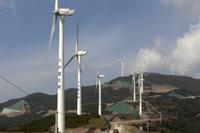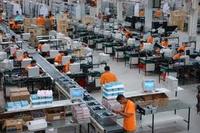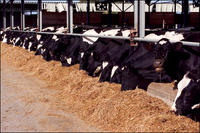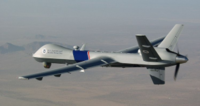-
Obama blocks purchase of U.S. wind farms by Chinese company

Last Friday President Barack Obama blocked a Chinese company from owning four wind farm projects in northern Oregon; Obama cited security risks for the action, making it the first time in twenty-two years that a U.S. president has blocked a foreign business deal
-
-
Herbicide-resistant crops require more herbicides
Researchers find that the use of herbicides in the production of three genetically modified herbicide-tolerant crops — cotton, soybeans, and corn — has actually increased; this counterintuitive finding is based on an exhaustive analysis of publicly available data from the U.S. Department of Agriculture’s National Agriculture Statistics Service
-
-
U.S. manufacturers moving their manufacturing operations back to U.S.

Increasingly, U.S. firms are moving or considering moving their manufacturing operations back to domestic soil from overseas; fueling the trend are rising labor costs in emerging countries, high oil prices, and increasing transportation costs, global risks such as political instability, and other factors
-
-
Different industries will benefit from different election results
The outcome of the presidential election will not only affect taxpayers, but several industries as well; if Mitt Romney wins the election, defense contractors, oil, coal, and big banks should expect a brake on new regulations and roll back of some existing regulations, as well as tax breaks; if Barack Obama is given a second term by the voters, green energy firms, hospitals, and health insurance firms will likely benefit
-
-
Trading water: the pros and cons
Water is a commodity, and water rights can be freely traded in an open market. Proponents of the free market approach argue that it leads to the most efficient allocation of water resources, as it would for any other commodity
-
-
Former DHS official says U.S. should go on cybersecurity offensive
Stewart Baker, the first assistant secretary for policy at DHS under President George W. Bush, has a straightforward theory when it comes to cyber security in the United States: “To prevail in the cybersecurity war, defense is not enough”; not all cuber experts agree with him
-
-
Experts warn of growing cyber security risks to U.S., criticize Congress’s inaction
U.S.and Russian cyber experts are trying to scare officials into improving cybersecurity protection in the United Statesand around the world; cyber attacks against critical infrastructure escalate in scope and severity; soon, Kaspersky Lab’s Eugene Kaspersky said: “If previous viruses were like bicycles,then the Stuxnet worm that damaged uranium enrichment centrifuges at the Natanz plant in Iran two years ago would be a plane and the latest programs, dubbed Flame and Gauss,would be space shuttles”
-
-
Explosives dumped into Gulf of Mexico pose big problems
Millions of pounds of unexploded bombs and other military ordnance that were dumped decades ago in the Gulf of Mexico, as well as off the coasts of both the Atlantic and Pacific oceans, could now pose serious threats to shipping lanes and the 4,000 oil and gas rigs in the Gulf, warns two oceanographers
-
-
China homeland security and public safety market to reach $105 billion by 2020
By 2014 China’s homeland security and public safety market will replace the U.S. market as the leading national homeland security and public safety market; the market will grow from $45 billion in 2012 to $105 billion by 2020
-
-
Security Essen 2012: 39,000 attendees, 1,086 exhibitors
Security Essen, the international forum for solutions relating to everything having to do with civil security and fire protection technology was held 25-28 September in Essen, Germany; more than 39,000 trade visitors from 115 countries were offered information from 1,086 exhibitors from forty nations
-
-
Probability maps help detect food contamination

Researchers demonstrate how developing a probability map of the food supply network using stochastic network representation might shorten the time it takes to track down contaminated food sources; stochastic mapping shows what is known about how product flows through the distribution supply chain and provides a means to express all the uncertainties in potential supplier-customer relationships that persist due to incomplete information
-
-
How vulnerable is the U.S. to agro-terror attack?

Since the 9/11 terrorist attacks, the United States has spent billions of dollars to make the country safer from another catastrophic event, but little of that money, and little attention, have been directed toward preventing, coping with, and recovering from a terrorist agro-attack; how vulnerable is the United States to an attack on its food system?
-
-
Technology soon to make drones deadlier, more autonomous

Unmanned aerial vehicles (UAVs) have become America’s main weapon in the campaign against terrorists — at the forefront are the Predator and the Reaper — and technological changes would soon make them even deadlier; in the next decade drones will be faster and carry more weapons than today’s versions; they will also have better sensors and more sophisticated computers, allowing them to plan and execute attacks with little human participation
-
-
Keystone XL pipeline: reliability of remote oil-spill sensors questioned
The oil industry plans to build thousands of miles of pipelines in the next five years, making leak detection a growing issue; many of the new pipelines will cross aquifers and rivers which are used for drinking water and irrigation; the Keystone XL pipeline has already experienced its share of controversies, and now there is a debate over the quality and reliability of the pipeline’s sensor system for remote detection of oil spills
-
-
Repair bill for Miami-Dade water and sewage system: $12 billion
Repairing, replacing, and rebuilding 13,000 miles of old water and sewage pipes and the treatment plants they connect to could cost Miami-Dade County, Florida more than $12 billion dollars over the next fifteen years; this is a staggering amount – made even more so in light of the fact that this is considerably more than the original estimate of $1 billion
-
More headlines
The long view
Factories First: Winning the Drone War Before It Starts
Wars are won by factories before they are won on the battlefield,Martin C. Feldmann writes, noting that the United States lacks the manufacturing depth for the coming drone age. Rectifying this situation “will take far more than procurement tweaks,” Feldmann writes. “It demands a national-level, wartime-scale industrial mobilization.”
Trump Is Fast-Tracking New Coal Mines — Even When They Don’t Make Economic Sense
In Appalachian Tennessee, mines shut down and couldn’t pay their debts. Now a new one is opening under the guise of an “energy emergency.”
Smaller Nuclear Reactors Spark Renewed Interest in a Once-Shunned Energy Source
In the past two years, half the states have taken action to promote nuclear power, from creating nuclear task forces to integrating nuclear into long-term energy plans.
